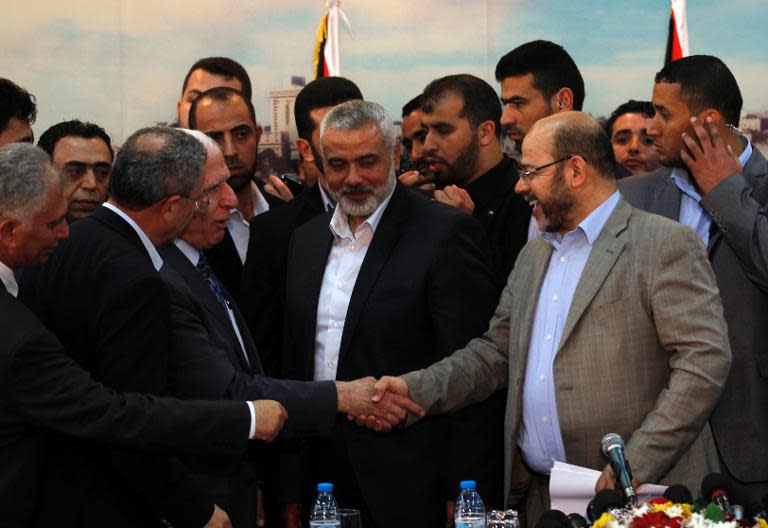Palestinians pledge unity as Israel talks teeter
Rival Palestinian leaders from the West Bank and Gaza Strip agreed on Wednesday to form a unity government soon, bringing thousands of people on to the streets in celebration. Amid the jublilation, an Israeli air strike on Gaza wounded six people, the coastal territory's Islamist ruling movement Hamas said. "An agreement has been reached on the formation within five weeks of an independent government headed by president Mahmud Abbas," said a joint statement read out by Hamas's Gaza premier Ismail Haniya in front of a visiting delegation from the Palestine Liberation Organisation (PLO). It was not the first time that the rivals have announced a deal to end seven years of separate Palestinian administrations in the West Bank and Gaza. But the latest attempt by the West Bank-based Palestinian leadership to reconcile with Hamas in Gaza drew an angry reaction from Israeli Prime Minister Benjamin Netanyahu who said it showed it was not serious about 11th-hour efforts to salvage US-brokered peace negotiations. Shortly after the deal was announced an Israeli warplane attacked a target at Beit Lahiya, north of Gaza City, wounding six people, one seriously, the Hamas interior ministry said. An Israeli military statement described the strike as "a joint counter-terrorism operation" by the air force and the Shin Bet intelligence agency, and indicated that it missed its intended target. - Public jubilation across Gaza - "A hit was not identified," it said, without elaborating. The Palestinian agreement was reached during overnight talks in Gaza City between Hamas leaders and a PLO team headed by Azzam al-Ahmad, a senior figure in Abbas's Fatah movement. It was greeted with public celebration in Gaza City and in towns and refugee camps throughout the enclave, with crowds waving Palestinian flags and shouting "Palestinian unity!" The rival sides have announced several times before that they would make way for a coalition of technocrats, but such pledges were never implemented and analysts expressed scepticism that this time would be any different. "People have heard the same thing over and over again and each time the agreement had been broken by either Fatah or Hamas," said Samir Awad, politics professor at Birzeit University in the West Bank. - 'Abbas has to choose' - Analyst Hani al-Masri said: "This reconciliation has hardly any substance on the ground. It could collapse at any moment. "Reconciliation (between the Palestinian factions) and negotiations (with Israel) are now just tactics -- each side has its own calculations." The latest announcement of a deal came as US-brokered peace talks teetered on the edge of collapse, and drew an angry response from Netanyahu who accused the Palestinian president of choosing a deal with Hamas instead of an agreement with Israel. "Instead of moving into peace with Israel, he's moving into peace with Hamas," the Israeli premier said. "He has to choose. Does he want peace with Hamas or peace with Israel? "You can have one but not the other. I hope he chooses peace, so far he hasn't done so." Palestinian chief negotiator Saeb Erakat countered that peace with Israel was impossible without Palestinian unity. "We can't reach peace without reconciliation first," he said. Erakat held yet another meeting with his Israeli counterpart Tzipi Livni and US envoy Martin Indyk on Tuesday in a bid to salvage the peace talks, which are due to end on April 29 if there is no agreement on their extension. "The meeting lasted several hours but we did not manage to overcome our differences," Erakat said. "We will continue to meet the Israeli delegation up to April 29 but clearly the Israelis don't want to move the peace process forward." Abbas has said he will extend the negotiations only if Israel frees a batch of Arab prisoners previously earmarked for release, freezes settlement building in the West Bank, including annexed east Jerusalem, and agrees to discuss the borders of a future Palestinian state. Netanyahu on Wednesday accused him of setting impossible terms. "We're trying to relaunch the negotiations with the Palestinians. Every time we get to that point, Abu Mazen (Abbas) stacks on additional conditions which he knows that Israel cannot give."





